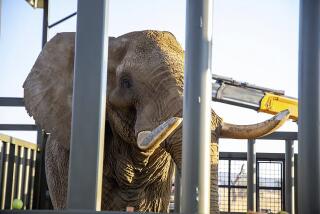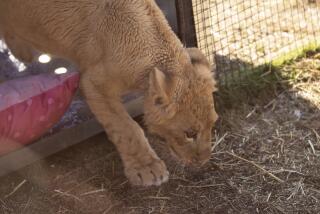South Africa Reins In Its Young Elephants
- Share via
PILANESBERG, South Africa — Some teenagers are raising hell in the untamed bush here, tormenting the wild animals and giving tourists a terrible fright.
Such rowdiness may sound typical for adolescents, except these delinquents are running amok in one of South Africa’s most popular game reserves. They have killed rhinos. They have charged cars of safari-goers. And to make matters worse, they are elephant-sized--well, to be precise, they are elephants.
“There appears to be a discipline problem among the young elephant bulls,” said Douw Grobler, veterinarian at Kruger National Park, where many of the elephants at Pilanesberg once lived. “There is a missing link in the elephant population at Pilanesberg. There is a need for the presence of adult elephant bulls. They act as the disciplinarians.”
Pilanesberg National Park is Africa’s biggest experiment in man-made nature, and like most things human, there was a margin of error when it was conceived nearly 30 years ago.
Nestled in the crater of an ancient volcano, the game reserve was born from a mining and farming community about 90 miles north of Johannesburg. Buildings were dismantled and hauled away. Plants not native to the area were replaced with indigenous vegetation. Entire villages were moved beyond its fences, which enclose a spruced-up natural habitat the size of Los Angeles.
Then, in a relocation plan rivaling Noah’s efforts with his ark, nearly 6,000 animals of 19 species were moved to Pilanesberg from across southern Africa. The translocation, as such animal movements are known, was nicknamed Operation Genesis.
But zoologists now suspect that Pilanesberg’s human creators paid too little attention to nature’s supervision of the young elephants set free in its grassy plains and wooded ravines. The transplanted juveniles were the orphans of elephants culled by park authorities at Kruger during the 1970s, ‘80s and early ‘90s.
Now, as the young elephants begin reaching sexual maturity, the effects of their broken home life are becoming dangerously apparent.
Rebuffed by older elephant cows, some teenage bulls have taken to mating with the white rhinoceros, the largest available pachyderm around. Several rhinos have been killed in the process. Other young bulls are taking out their aggression on people, charging groups of tourists who roam Pilanesberg’s unpatrolled dirt roads in private vehicles.
Two years ago, a young bull killed a professional hunter who had been sent to shoot him after an attack on tourists. Earlier, a German businessman was killed when several young bulls attacked his car and he rushed to save his toddler daughter, who had fallen out the window.
No one at Pilanesberg has been killed recently, but authorities are so concerned about the ill-tempered elephants that in March they introduced half a dozen adult bull elephants from Kruger in hopes of sorting things out.
The bulls, all more than 40 years old, should not only impose some fatherly discipline on the upstarts, but zoologists expect that they will delay or shorten the period of sexual belligerence--known as musth--of the young elephants. Some Pilanesberg males have come into sexual heat 10 years earlier than normal, probably because there were no older bulls to serve as sexual role models.
“Hopefully, the adult bulls will put these young elephants into their place,” said zoologist Marion Garai, who chairs the Elephant Management and Owners Assn. of South Africa. “But to be honest, we really don’t know what is going on. It is going to take a very long time to say for sure what the problem is.”
Gus van Dyk, field ecologist at Pilanesberg, said behavioral scientists from the University of KwaZulu-Natal have been called in to study the effect that the mature bulls are having on the park’s elephant population, which numbers about 50.
Although it is too early to make conclusions, he said, park officials are encouraged because no young elephant bulls have come into musth since March, and there have been no reported incidents involving rhinos. Some elephants still have not warmed up to the tourists, but park officials say such problems transcend the unruly bulls.
Because of the early success here, officials at nearby Madikwe Game Reserve last month introduced six adult elephant bulls there as a preemptive measure. The Madikwe reserve also had only young bulls and older females. Meanwhile, elephant culling at Kruger has been stopped.
“We now know that introducing elephants as a group of youngsters is very detrimental to their social development,” said Markus Hofmeyr of the Madikwe reserve. “Elephants are highly social and intelligent animals that learn from older and experienced animals throughout their life.”
More to Read
Sign up for Essential California
The most important California stories and recommendations in your inbox every morning.
You may occasionally receive promotional content from the Los Angeles Times.













